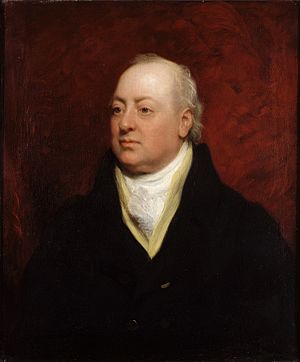Everard Home facts for kids

Sir Everard Home (born May 6, 1756, in Kingston upon Hull – died August 31, 1832, in London) was an important British surgeon. He was also a Fellow of the Royal Society, which is a group of leading scientists.
Early Life and Learning
Everard Home grew up in Kingston upon Hull. He went to Westminster School to study. He even won a scholarship to Trinity College at Cambridge. But instead of going to university, he chose a different path.
He decided to learn from his brother-in-law, John Hunter. John Hunter was a famous surgeon. Everard Home became his student at St George's Hospital. John Hunter was married to Everard's sister, Anne Home. Everard helped Hunter with many of his studies about the body.
Becoming a Surgeon
In 1778, Everard Home finished his training at Surgeons' Hall. He then became an assistant surgeon at the naval hospital in Plymouth.
Later, in 1787, he became an assistant surgeon at St George's Hospital, where he had studied. He eventually became a full surgeon there. He also served as the King's Sergeant Surgeon starting in 1808. This was a very important job. In 1813, he was given the special title of Baronet.
Discoveries and Studies
Sir Everard Home was the first person to describe a fossil creature found in 1812. This creature was discovered near Lyme Regis by Joseph Anning and Mary Anning. Today, we know this fossil as an Ichthyosaur, which was a large marine reptile. At first, Home thought it was related to fish.
He also studied the unique platypus. He learned that platypuses do not give birth to live young like mammals. Instead, he thought they laid eggs that hatched inside the mother's body, which is called ovoviviparous. Sir Everard Home wrote many papers about the anatomy of both humans and animals.
A type of turtle, the Kinixys homeana, was named after him by Bell in 1827.
Awards and Recognition
Sir Everard Home became a Fellow of the Royal Society in 1787. He gave many important talks called the Croonian Lecture between 1793 and 1829. In 1807, he received the Copley Medal, which is a very high award for scientific work. In 1832, he was also made an honorary member of the American Academy of Arts and Sciences.
His son, James Everard Home, also became a well-known officer in the Royal Navy.
 | Ernest Everett Just |
 | Mary Jackson |
 | Emmett Chappelle |
 | Marie Maynard Daly |

